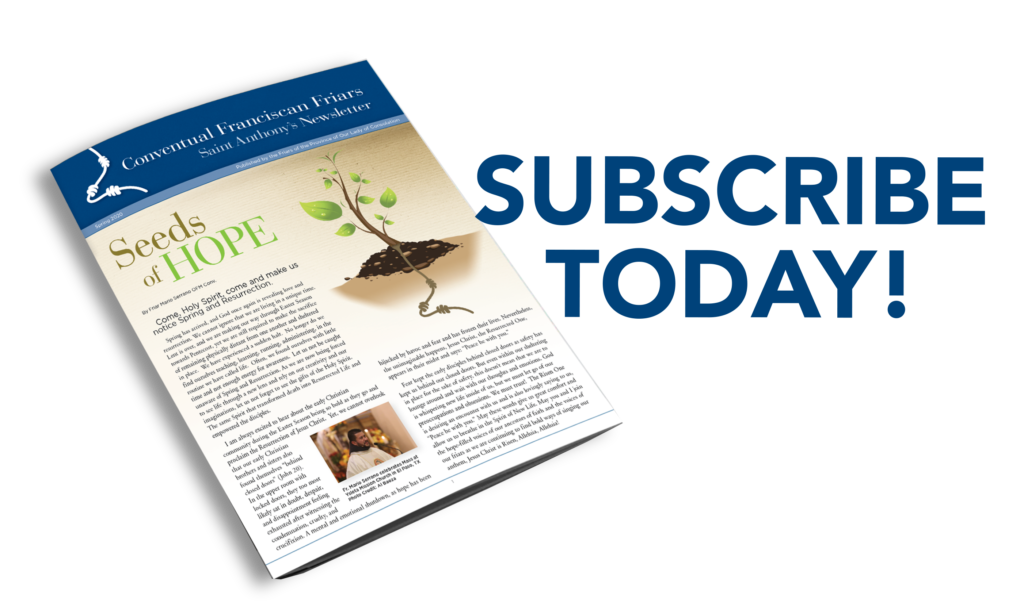Interreligious Dialogue with our Human Family
Friar Steve McMichael, OFM Conv., serves as Associate Professor of Theology at the University of St. Thomas in St. Paul, MN. Fr. Steve holds a Doctorate of Sacred Theology in Fundamental Theology from the Gregorian University in Rome. He often serves as a Pilgrimage Leader for Franciscan Pilgrimage Programs. Fr. Steve has participated in Inter-Religious Dialogue Groups for over 35 years.
How and when did you become involved in inter-religious dialogue?
When I was a student in Rome in the mid-1980s, another Friar, Patrizio Spina, invited me to meet the Notre Dame Sisters of Sion, who had an excellent Library and who conducted tours of the former Jewish Ghetto in Rome. I needed some type of outside ministry while in Rome, and I asked the powers that be if I could assist the Sisters with these tours. My ministry there led me to the work of Friar Alphonso de Spina, whose work was the subject of my doctoral dissertation.
When I returned to the United States I taught a course on the Holocaust as an Adjunct Professor at Saint Louis University and I became involved with Ecumenical Commission of the Archdiocese of St. Louis as well as the Interfaith Partnership of St. Louis.
How did your interest in dialogue with Islam come to be?
A course on Islam that I took with Jack Renard left a deep impression on me. St. Francis’ friendship with Sultan Malik Al-Kamil also reminded me of the Franciscan-Muslim connection. When I arrived at St. Thomas University, I was asked to teach courses on Islam and World Religions. Another faculty member, Terry Nichols, was starting a center for Christian-Muslim dialogue and invited me to participate. I also have been part of a dialogue group here in the Twin Cities for many years.
How did your involvement in inter-religious dialogue affect your perspective on your Catholic and Franciscan spirituality?
I see these conversations as an opportunity to build bridges. We start with mutual understanding and respect of each other’s traditions. We are distinct, but we also share much in common. Vatican II’s groundbreaking document on Christianity and its relationship with the world religions, Nostra Aetate, especially paragraph 3, opens up many possibilities.
What were some of the “epiphanies” that you experienced as a result of inter-religious dialogue?
If you have a certain amount of trust and respect for each other and each others’ traditions, the dialogue will be very fruitful; it’s really about building relationships among one another. We share our strengths as well as our weaknesses. In St. Francis, I see one who saw service as the hallmark of discipleship. Both Judaism and Islam share a strong commitment to service.
To me, the dialogue between Muslims and Christians is most productive when we center on areas where we have common ground, especially in the Muslim view of Jesus as a prophet; this also leads to shared concerns in the areas of social justice and care of the environment. St. Paul says that we must have the same mindset of Christ, i.e., of emptying ourselves (see Philippians 2:6-11). Our shared quest for finding the common good reveals that we have much more that unites us than divides us.
With Pope Francis highlighting the themes of “Healing the World” and “Solidarity” how has your involvement in inter-religious dialogue affected your understanding of “Solidarity”?
The more that we can find some kind of common ground, especially around social issues, the poor, the sick, the migrants, and the environment, the more we can heal our misunderstandings and misconceptions of one another. Luke’s Gospel, with its emphasis on the forgotten and the marginalized, is where the rubber hits the road. In that compassion, in that care that we exhibit for others, we will be brought closer together.
There is also a solidarity in our thinking about Creation. The Qur’an is very much in harmony with an understanding of creation that St. Bonaventure articulates. Everything in creation points to and leads to the Creator. I have noticed that Muslims are very cautious about associating the human with the divine. In the Qur’an, human beings are formed with mud and the breath of God, not in the divine image.
As we engage in these conversations, we begin to see one another as brother and sister, not “the other.” We begin to realize that we are a part of this diverse, extended family. These days, with so much disinformation being spread, we must not let other forces drive us apart. In the words of Nostra Aetate: “Since in the course of centuries not a few quarrels and hostilities have arisen between Christians and Muslims, this sacred synod urges all to forget the past and to work sincerely for mutual understanding and respect, and to preserve as well as to promote together for the benefit of all humankind social justice and moral welfare, as well as peace and freedom.”



